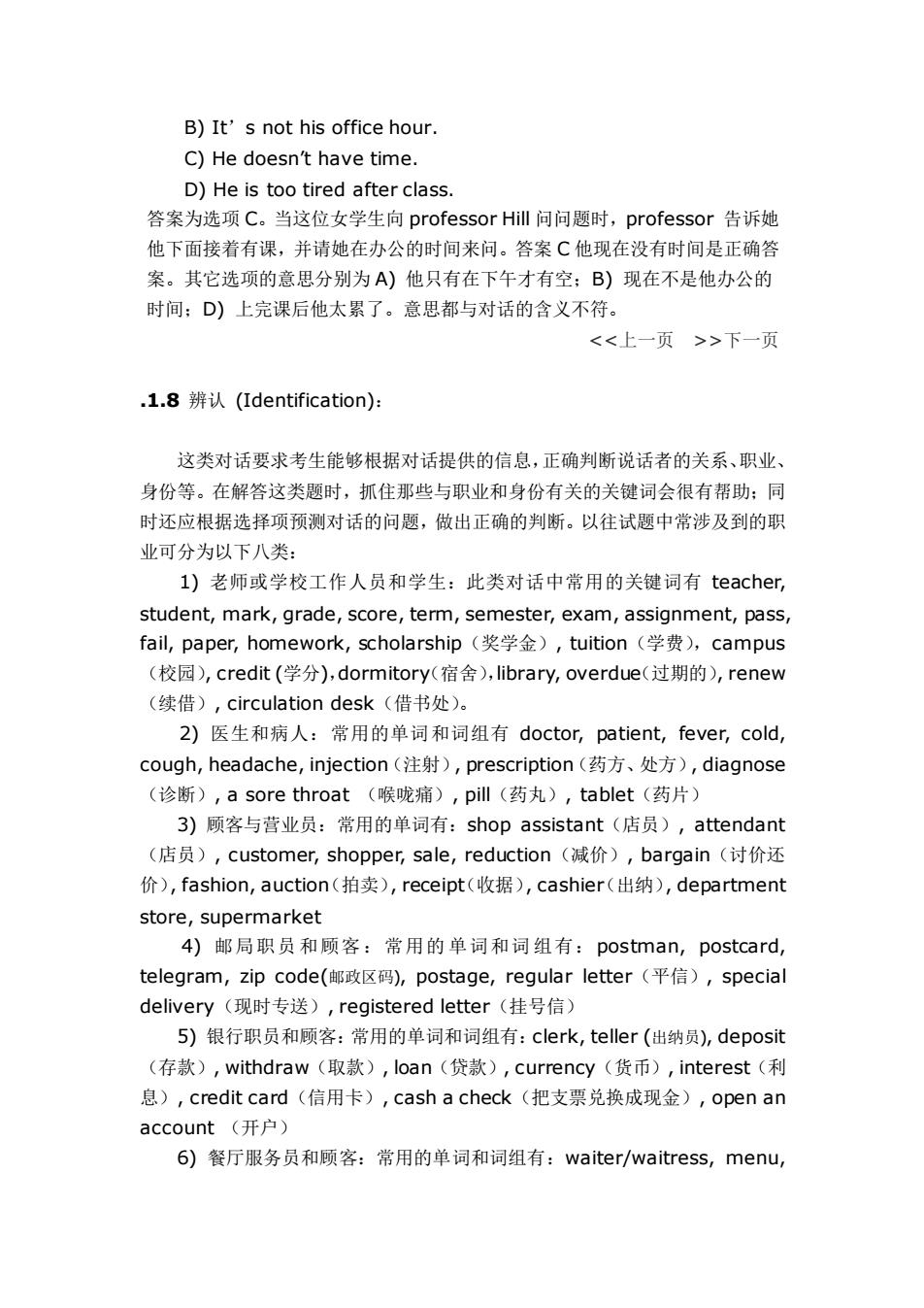
What does the man mean?How does the man feel about?以97年6月四级考试中的一段对话为例:M: I don't feel like going out. Why don't we just stay home and watchTVinstead?W:Come on!You promised to take me out for dinner and to thetheatre on my birthday.Q:What do we learn fromthe conversation?A) The woman insists on going out.B)Thewomandoesn't like watching TV.C) The man promised her a gift on her birthday.D) The man is too tired to go out.答案为选项A)。男士说他不想出去,想呆在家里看电视。注意dontfeellike的意思是“不想”,表示“否定”;whydon”t表示“为什么不”,是提建议的一种表达方式。而女士坚持要出去,因此答案是选项A)Thewomaninsists on going out.1.1.7原因与结果(CauseandEffect):这类试题着重考查考生对因果关系句子的理解,即通过说话者的对话了解事情发生的前因与后果。同学们要想做好这类考题,必须掌握表示因果关系的形式,例如becauseof,dueto,owingto,for,therefore,hence,sothat,asaresult,because等。常见的问题类型有:Why...?What causes...?What happened...?What is the man's reason for...?以99年6月四级考试中的一段对话为例:W:Excuse me,professor Hill.MayI ask youa few questions?M:Yes, of course.But I'm sorryI have a class at ten.Why don't youcomeinmy officehours.Thatis4 to5p.m.Monday,Thursday andFriday.Q:Whycan'tprofessorHill answerher questionsnow?A) He will only be available in the afternoon
What does the man mean? How does the man feel about? 以 97 年 6 月四级考试中的一段对话为例: M: I don’t feel like going out. Why don’t we just stay home and watch TV instead? W: Come on! You promised to take me out for dinner and to the theatre on my birthday. Q: What do we learn from the conversation? A) The woman insists on going out. B) The woman doesn’t like watching TV. C) The man promised her a gift on her birthday. D) The man is too tired to go out. 答案为选项 A)。 男士说他不想出去,想呆在家里看电视。注意 don’t feel like 的意思是“不想”,表示“否定”;why don’t 表示“为什么不.”,是提 建议的一种表达方式。而女士坚持要出去,因此答案是选项 A) The woman insists on going out。 1.1.7 原因与结果 (Cause and Effect): 这类试题着重考查考生对因果关系句子的理解,即通过说话者的对话了解 事情发生的前因与后果。同学们要想做好这类考题,必须掌握表示因果关系的 形式,例如:because of, due to, owing to, for, therefore, hence, so that, as a result, because 等。常见的问题类型有: Why.? What causes.? What happened.? What is the man’s reason for.? 以 99 年 6 月四级考试中的一段对话为例: W: Excuse me, professor Hill. May I ask you a few questions? M: Yes, of course. But I’m sorry I have a class at ten. Why don’t you come in my office hours. That is 4 to 5 p.m. Monday, Thursday and Friday. Q: Why can’t professor Hill answer her questions now? A) He will only be available in the afternoon

B)It'snothisofficehour.C) He doesn't have time.D)Heistootiredafterclass.答案为选项C。当这位女学生向professorHill问问题时,professor告诉她他下面接着有课,并请她在办公的时间来问。答案C他现在没有时间是正确答案。其它选项的意思分别为A)他只有在下午才有空;B)现在不是他办公的时间;D)上完课后他太累了。意思都与对话的含义不符。<<上一页>>下一页.1.8辨认(Identification):这类对话要求考生能够根据对话提供的信息,正确判断说话者的关系、职业、身份等。在解答这类题时,抓住那些与职业和身份有关的关键词会很有帮助;同时还应根据选择项预测对话的问题,做出正确的判断。以往试题中常涉及到的职业可分为以下八类:1)老师或学校工作人员和学生:此类对话中常用的关键词有teacher,student, mark,grade, score,term,semester, exam,assignment, pass,failpaper,homework,scholarship(奖学金),tuition(学费),campus(校园),credit(学分),dormitory(宿舍),library,overdue(过期的),renew(续借),circulationdesk(借书处)。2)医生和病人:常用的单词和词组有doctor,patient,fever,coldcough,headache,injection(注射),prescription(药方、处方),diagnose(诊断),asorethroat(喉咙痛),pill(药丸),tablet(药片)3)顾客与营业员:常用的单词有:shopassistant(店员),attendant(店员),customer,shopper,sale,reduction(减价),bargain(讨价还价),fashion,auction(拍卖),receipt(收据),cashier(出纳),departmentstore,supermarket4)邮局职员和顾客:常用的单词和词组有:postman,postcard,telegram,zipcode(邮政区码),postage,regularletter(平信),specialdelivery(现时专送),registeredletter(挂号信)5)银行职员和顾客:常用的单词和词组有:clerk,teller(出纳员),deposit(存款),withdraw(取款),loan(贷款),currency(货币),interest(利息),creditcard(信用卡),cashacheck(把支票兑换成现金),openanaccount(开户)6)餐厅服务员和顾客:常用的单词和词组有:waiter/waitress,menu
B) It’s not his office hour. C) He doesn’t have time. D) He is too tired after class. 答案为选项 C。当这位女学生向 professor Hill 问问题时,professor 告诉她 他下面接着有课,并请她在办公的时间来问。答案 C 他现在没有时间是正确答 案。其它选项的意思分别为 A) 他只有在下午才有空;B) 现在不是他办公的 时间;D) 上完课后他太累了。意思都与对话的含义不符。 <<上一页 >>下一页 .1.8 辨认 (Identification): 这类对话要求考生能够根据对话提供的信息,正确判断说话者的关系、职业、 身份等。在解答这类题时,抓住那些与职业和身份有关的关键词会很有帮助;同 时还应根据选择项预测对话的问题,做出正确的判断。以往试题中常涉及到的职 业可分为以下八类: 1) 老师或学校工作人员和学生:此类对话中常用的关键词有 teacher, student, mark, grade, score, term, semester, exam, assignment, pass, fail, paper, homework, scholarship(奖学金), tuition(学费),campus (校园), credit (学分),dormitory(宿舍),library, overdue(过期的), renew (续借), circulation desk(借书处)。 2) 医生和病人:常用的单词和词组有 doctor, patient, fever, cold, cough, headache, injection(注射), prescription(药方、处方), diagnose (诊断), a sore throat (喉咙痛), pill(药丸), tablet(药片) 3) 顾客与营业员:常用的单词有:shop assistant(店员), attendant (店员), customer, shopper, sale, reduction(减价), bargain(讨价还 价), fashion, auction(拍卖), receipt(收据), cashier(出纳), department store, supermarket 4) 邮局职员 和顾客 :常用的 单词和词 组有:postman, postcard, telegram, zip code(邮政区码), postage, regular letter(平信), special delivery(现时专送), registered letter(挂号信) 5) 银行职员和顾客:常用的单词和词组有:clerk, teller (出纳员), deposit (存款), withdraw(取款), loan(贷款), currency(货币), interest(利 息), credit card(信用卡), cash a check(把支票兑换成现金), open an account (开户) 6) 餐厅服务员和顾客:常用的单词和词组有:waiter/waitress, menu